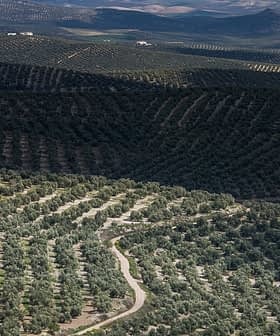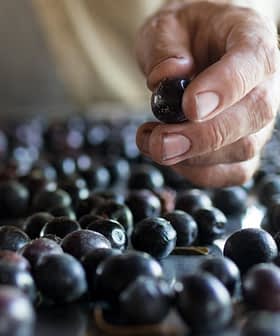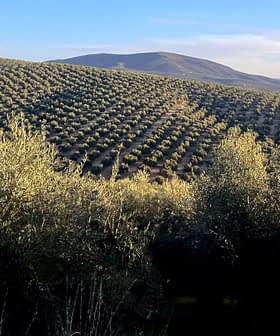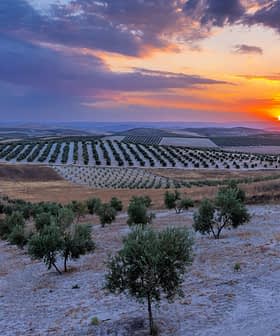Laws Governing Olive Oil Sector in Spain Set to Change
Updated legislation will require the implementation of a new traceability system and change labeling requirements.
New quality standards for olive oil and olive pomace oil in Spain, proposed by Ainia, will be codified into law later this year, including a new traceability system and changes to labeling requirements. The new legislation aims to update regulations from 1983, adapt to new realities in the olive sector, and differentiate how olive oil is regulated compared to vegetable oils, which could lead to lower production costs and clearer rules for consumers. The new measures will require clear labeling of olive oil products and provide regulators and consumers with a transparent view of what is in each bottle.
A series of new quality standards for olive oil and olive pomace oil in Spain will be codified into law later this year.
The measures include the implementation of a new traceability system throughout the production chain, the differentiation of how olive oil is regulated compared with vegetable oil and changes to labeling requirements.
The better the knowledge of a product is, the more each of the links in the chain benefits, especially the producer and the final consumer.
The new standards were proposed by the Agrifood Industrial Technology Center (Ainia), a non-profit focused on agribusiness, and have been working their way through Spain’s legislative process since 2018.
“From our point of view, it is necessary that this legislation is updated since the current legislation for olive oil is from 1983,” José María Ferrer, the head of food policy at Ainia, told Olive Oil Times.
See Also:Olive Oil Standards“In addition to trying to replace regulations that have been in existence for many years, it is also necessary to try to adapt the legislation to the new reality of the olive sector,” he added.
The role of technology in traceability is one of these new realities. The new measures will require data from olive oils to be tracked through every step of the production and distribution process.
However, no single method to do so has been legislated, which Ferrer believes will provide flexibility for different sized operations to adopt practices appropriate for their respective budgets.
“Traceability systems aim at the possibility of finding and following the trail, through all stages of production, transformation and distribution of a food, and this can be done in very different ways and consequently with a very variable cost,” Ferrer said.
In spite of the added cost that implementing traceability systems will incur on producers, Juan Vilar, an analyst and consultant, believes the long-term benefits far outweigh the short-term costs.
“The better the knowledge of a product is, the more each of the links in the chain benefits, especially the producer and the final consumer,” he told Olive Oil Times.
This is especially true in the case of blended extra virgin olive oils, in which olives of many different provenances and varieties are processed in the same tank. The new traceability system would require this information to be verified, providing regulators and consumers with a clear picture of what is in every bottle.
While implementation and enforcement are likely to be a challenge for all involved, Vilar believes the new measures will help promote olive oil as a healthy product.
“This monopolization of the process, from the field to the shelf, is essential to be able to know in detail everything that happened in each link of the chain,” Vilar said. “The more information and transparency, the better a sector develops, especially one of a nutritional nature.”
Along with adding transparency to the olive oil production and distribution sector, the new measures will also separate how olive oil is regulated compared with vegetable oils.
More effective regulations, in turn, could translate into lower production costs for farmers and differentiate how the public perceives olive oil in comparison to vegetable oils.
“The fact that a norm is exclusive to an area makes it more useful,” Vilar said. “This level of specialization entails more thorough management and a more tailor-made legal treatment, therefore, it could only be positive.”
Ferrer said that this change would streamline the bureaucratic process. Since olive oil and vegetable oils are fundamentally different – the former being a physically extracted fruit juice while the latter is produced using chemical solvents – it makes sense that different sets of rules govern their production.
“If the different types of [vegetable oils] that can be produced are better defined, this is positive for all agents in the food chain,” Ferrer said. “Consumers will be able to better understand the product they buy. The industry will have much clearer rules of the game and therefore the control and supervision work of the competent authorities will be easier and more effective.”
The new measures will also change labeling rules, including the adoption of stricter limits on what can be called olive oil.
“The mention ‘olive oil’ may only be used for the designation of the oils referred to in this standard, as provided for by regulation,” the new legislation reads. “In particular, it cannot be used in combination with other words to name any other oil.”
A common practice across the food industry is to mix extra virgin olive oil with canola oil or another type of vegetable oil and then sell the product under a label that emphasizes the olive oil. The new measures aim to curtail this practice.
While clearing up consumer confusion, Ferrar said that the implementation of the rule may lead to some disruption for producers.
“On the one hand, it will have a positive impact in terms of clarity regarding the information that is transferred,” he said. “On the other hand, there is an economic impact in terms of the need for new labels and other measures related to consumer information.”
However, Vilar believes the initial cost of changing labels and repackaging products will be compensated over time.
“In this case, the entire value chain also benefits, since you can only accompany a product on the label with the expression olive oil if it really contains olive oil,” he said.
Labels on mixed oils will need to clearly define how olive oil was used in the product and with which other vegetable oils it was mixed.
The new measures are set to be formally set into Spanish law later this year. The government’s Board of Food Quality and Coordination will then oversee the implementation of the measures and their enforcement.









